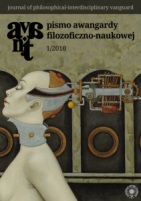Fantom ciała jako cielesna samoświadomość
Body phantom as bodily self-consciousness
Author(s): Przemysław NowakowskiSubject(s): Philosophy
Published by: Ośrodek Badań Filozoficznych
Summary/Abstract: According to Peter Halligan, […] it is important to consider that the experience of our body is largely the product of a continuously updated „phantom” generated by the brain. (Halligan 2002: 266). Next, he adds: I will argue (not withstanding pathology to the physical body) that the prevalent common sense assumption of phantom experience as pathological is wrongheaded and largely based on a long-standing and pernicious folk assumption that the physical body is necessary for experience of a body. (Halligan 2002: 252). These two remarks can serve as a backdrop for a discussion of the problem of bodily self-consciousness presented in the article. If experiencing a phantom of an amputated limb is indeed not pathological, and if normal bodily experience is de facto based on the body phantom constructed by the brain, then our conception of this very phantom should prove relevant when trying to explain bodily self-consciousness. In the article, I propose that the body phantom is a phenomenal and functional model of one’s own body. This model has two aspects. On the one hand, it functions as a tacit sensory representation of the body that is at the same time related to the motor aspects of body functioning.
Journal: AVANT. Pismo Awangardy Filozoficzno-Naukowej
- Issue Year: 2010
- Issue No: 1
- Page Range: 225-249
- Page Count: 25
- Language: Polish

